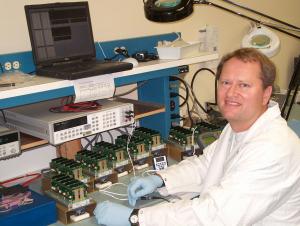Tomorrow we will bring updates for the launch. In the meantime, there is a 60% probability that the launch will be postponed due to the weather. Expect regular updates over the next few days
Avi Blizovsky

When the shuttle Discovery is launched to the International Space Station, it will engage with the research of Professor John Keys of the University of Miami to continue his research trying to find out how to grow food in microgravity.
The Kiss project is one of two experiments to be launched on Discovery that will be carried out on the International Space Station. Kiss, a professor of botany, won a $XNUMX million grant for the past six years for the experiment "TRPOI - analysis of an innovative sensing mechanism in root phototropism", an experiment that studies how plant roots react to different levels of both light and gravity. The insight gained from a tropical experiment will help create a stable plant-based life support system for future long-duration space missions, which are being planned at NASA. The plants are required as a source of food and as oxygen producers on long flights to Mars, for example.
Tropical (cultivation) includes dry seeds of the plant known as Arabidopsis thaliana, which are stored in special housings designed for seeds, explains Kiss. These habitats will float within the European Modular Cultivation System (EMCS), an experimental facility for biological research in microgravity. The EMCS is, in effect, a large greenhouse that provides control of the atmosphere, lighting and humidity in grow rooms.
Tropical will be the first experiment to be carried out in EMCS, which was developed by the European Space Agency. The experimental containers were developed by Kiss's team and by NASA, based on a design by researcher Richard Edelman, director of the electron microscope facility in Miami.
The shuttle Discovery will launch supplies, equipment and a new crew member (the European Thomas Reiter) to the International Space Station. When the experiment is brought aboard the spacecraft it will be performed automatically within the EMCS, and will require minimal involvement from the members of the station's 13th crew.
He said crew members would be required to load the containers into the EMCS, change videotapes and harvest the plants as they grow. The harvested plants will be stored in a freezer in an atmosphere of 80 degrees below zero until they return to Earth. When the plants return to Earth, probably at the end of the year, the data analysis will begin. The plants' germination, growth and curvature will be analyzed from the videos and DNA analyzes will be performed on the frozen plant samples to determine how different light and gravity conditions affect gene expression.
Kees and Edelman conducted studies of gravitopism (how plants respond to gravity) on two shuttle missions in 1997.
Plants may use a biological life support system on Mars, Kiss says. They can be engineered so that they can grow in the stress caused by a long space flight, such as a lack of water and high ethylene content, or the unique pressures of planets like Mars.
Coincidentally, just about a week ago, the astrophysicist Stephen Hawking stated in a lecture in Hong Kong that the survival of the human race requires humans to develop space colonies that can continue to exist without support from Earth.
To the home page of the project on the NASA website
For the original news (Uni. Miami press release)
Yadan International Space Station
Ydan "back to flight"
https://www.hayadan.org.il/BuildaGate4/general2/data_card.php?Cat=~~~515203906~~~88&SiteName=hayadan
